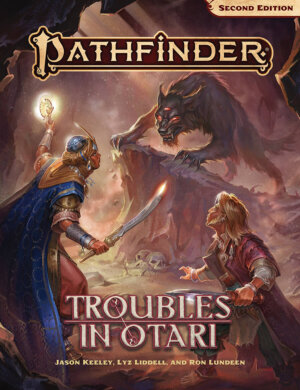
Publisher: Paizo Inc
Authors: Jason Keeley, Lyz Liddell, and Ron Lundeen
Artists: Igor Grechanyi, João Fiuza, Sammy Khalid, Robert Lazzaretti, Artur Nakhodkin, and Ernanda Souza
Year: 2020
Genre: Pathfinder roleplaying adventure aimed at new GMs as a next step from the Beginners Box
Pages: 64 pages
MSRP: 22.99 in softcover or $15.99 in PDF
One of the hallmarks of a good educational experience in the gradual addition of complexity and removal of unneeded supports. Each successive adventure in Otari adds a level of mechanical or narrative complexity without overwhelming players or GMs. The included guidelines help new GMs to develop good habits with regard to combat and narrative management without devolving into prescriptivism. Otari seeks to help GMs develop a more innate sense of how to scale difficulty in combat, how to help parties earn additional experience when needed, and how to manage it all without resorting to formulaic routine. The whole package is handled with a warm and approachable tone, the writers’ passion for their game evident from page one.
Likewise, Otari also does an admirable job in helping GMs remember what mechanics to rely on in given scenarios. For an experienced Pathfinder fan, this might feel obvious and overbearing, but for a GM just starting out, it’s a great way to translate the theory of the rulebook to the practice of real-time play.
Given that Troubles in Otari serves as another set of training wheels for those new to Pathfinder —and, arguably, tabletop roleplaying games at large— the difficulty curve is gentle. While failure does have consequences, they are somewhat more temporary than a typical adventure. For example, should players find themselves overwhelmed and knocked out while clearing out a fishing camp, suggestions are included for bailing the hapless adventurers out in a way that feels natural and organic to the story. Along those same lines, failed attempts to
Troubles in Otari never introduces a new element without offering advice or alternatives as to its implementation in real play. When it comes to puzzles, for instance, the book lays out three separate approaches to meet each individual group’s preferences. While Otari is absolutely a deeper dive into the world of Pathfinder, it’s also an excellent resource for how to approach problem solving as a GM.
The book’s layout is clean and true to form for Pathfinder adventures. The PDF is easy to navigate on screen, though in this case, the addition of hyperlinks would be a boon for GMs flipping between sections, particularly in the first two adventures. The included art is beautiful, though there is a case to be made for the relocation of character and creature portraits closer to their description, given the book’s intended audience. These are, however, minor complaints and do not detract from the product’s overall quality or playability.
The Otari setting is a great choice here as players and GMs who complete the path laid out in Troubles can progress to one of the Otari-oriented Adventure Paths. Though the Abomination Vaults, for instance, may require some tweaking to adjust for a fourth-level start instead of first-level, it feels like a natural next step in allowing the player characters to step up and defend their newfound home.
Authors Jason Keeley, Lyz Liddell, and Ron Lundeen had a clear vision for Troubles in Otari and they’ve executed it with aplomb. The book is a fantastic resource for new GMs and its clearing modeling of how to craft fun adventures adapted to the preferences of the group deserves a hearty round of applause. This is a product designed with a great deal of thought and carefully tuned and tailored to the needs of a truly novice gaming table. As much as the book excels in expanding mechanical repertoire, it is equally interested in building a GM’s confidence in running adventures, something many greenhorns sorely lack.
Troubles in Otari is, by design, not for everyone and is a stronger product for this narrower scope. For those who have just gotten their first taste of what it means to run a game, Troubles offers sage advice in an actionable package. The adventures included in this anthology are fun and surprisingly diverse; moreover, they allow for the feeling of progression, rather than just the rote dispensing of experience points in pursuit of the next level. For those who have played and enjoyed the Pathfinder Beginners Box, Troubles in Otari is a no-brainer and a worthy read for any would-be GM interested in the system.
[rwp-review id=”0″]